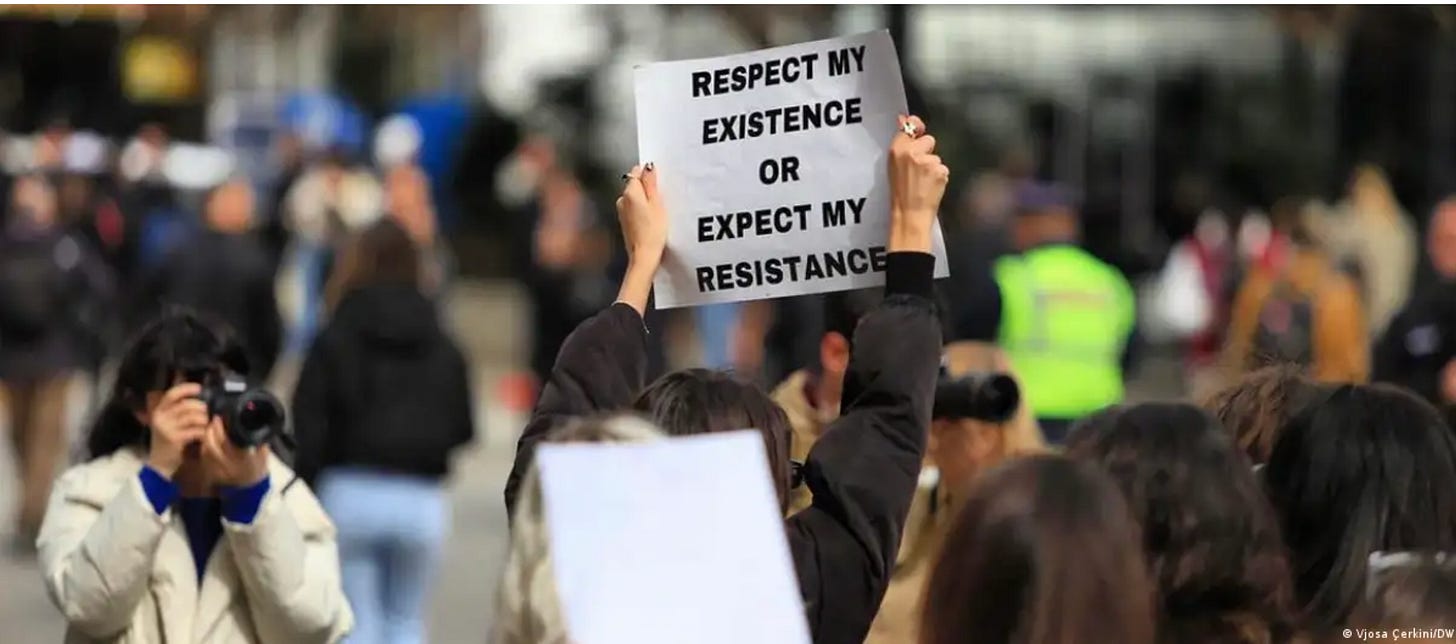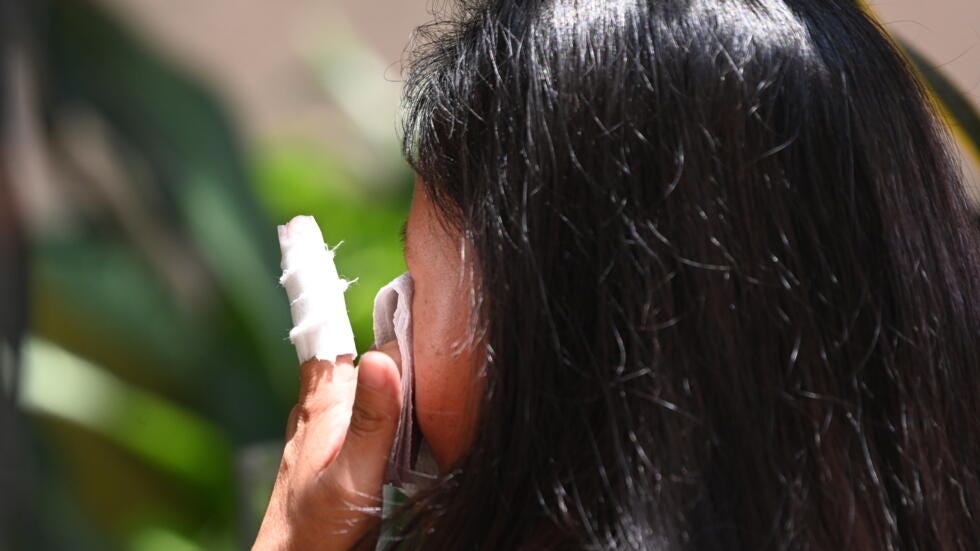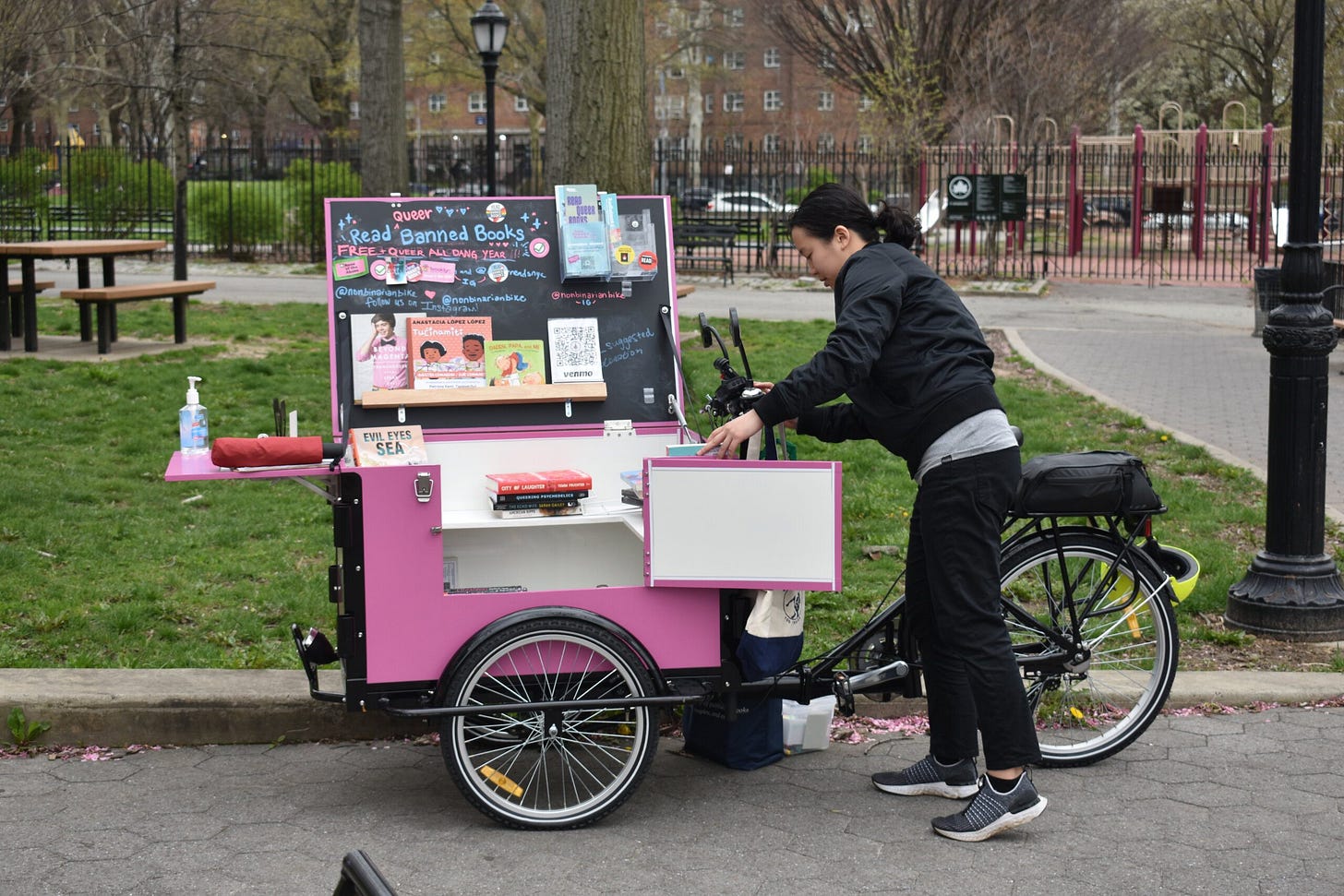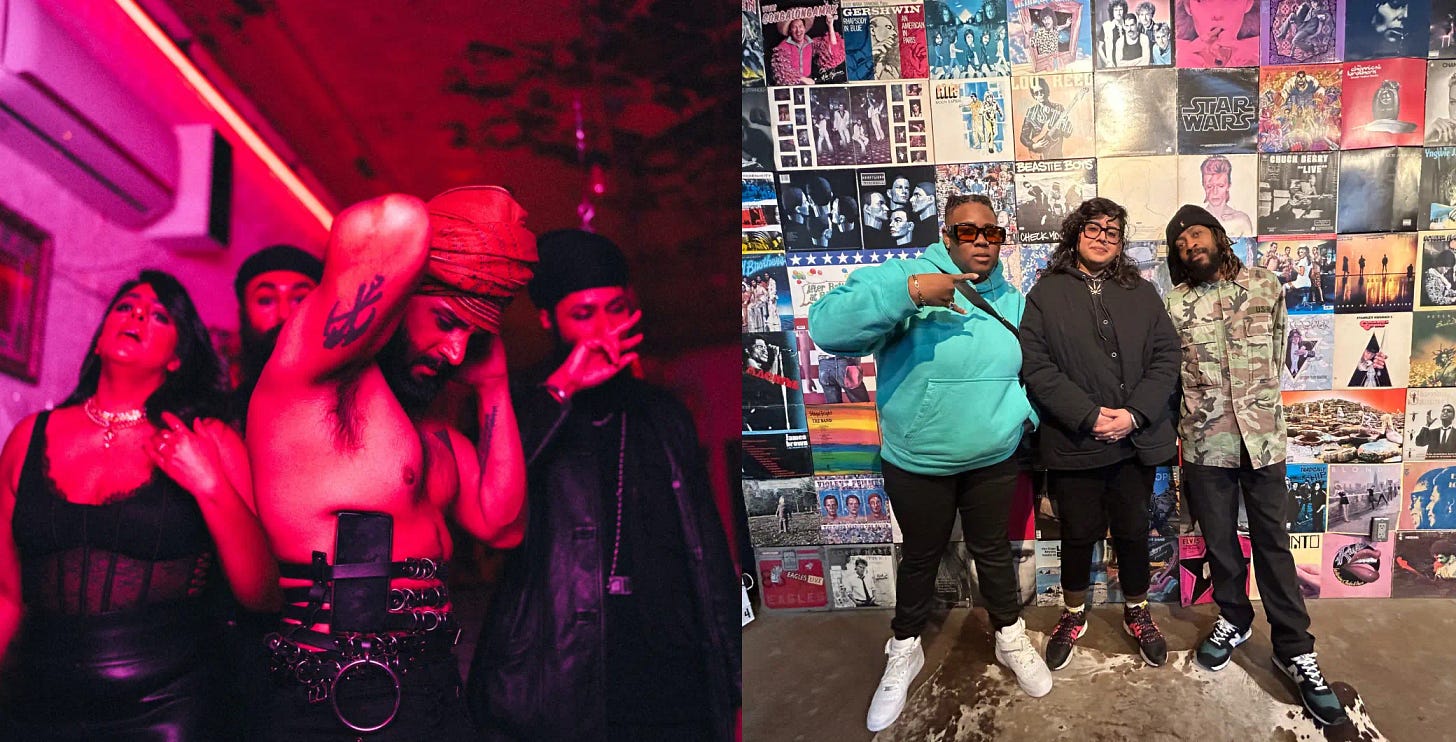Global Roundup: Nigeria Petition, Kosovo Femicide, Honduras Woman Seeks Justice, Queer Book Bike, Canada Panjabi Queer Community
Curated by FG Contributor Samiha Hossain
Brides on their way to a mass wedding ceremony in Kano state, Nigeria, in October 2023. Photograph: Kola Sulaimon/AFP/Getty Images
The plan, sponsored by Abdulmalik Sarkindaji, the speaker of the national assembly in the largely Muslim north-western state of Niger, was criticised by Nigeria’s women’s affairs minister, Uju Kennedy Ohanenye. She said she would seek a court injunction to stop the ceremony next week and establish if any of the girls were minors. Sarkindaji said the girls and young women were orphans whose parents were killed in attacks by kidnapping gangs that roam northern Nigeria. He said he would pay dowries to the grooms.
With over 8,000 signatures, the petition said the Niger state government should prioritise the education of the girls instead of forcing them into marriage.
We demand immediate action to halt the proposed forced marriages and to instead implement measures that will empower these girls to lead dignified and fulfilling lives. -Petition
Critics have expressed concern that some girls may be underage or being forced to comply for financial gain. Sarkindaji and the Imams Forum of Niger said the marriage ceremony would go ahead on 24 May and insisted the girls were not underage. After meeting on Wednesday, the imams forum said it would take legal action against Kennedy Ohanenye if she did not withdraw her statement suggesting the girls were minors.
After the murder of two women within a week in mid-April, people took to the streets of Pristina to call for a tougher stance on gender-based violenceImage: Vjosa Çerkini/DW
President Vjosa Osmani declared a day of national mourning in memory of all women and girls killed as a result of gender-based violence in Kosovo. But for years, activists and human rights organizations have been criticizing the structural deficiencies in the country that allow Kosovar women to become victims of violence again and again. Many are asking what has to happen for something to finally change.
Intimate partner violence was made a criminal offense in Kosovo in 2019. The courts can now impose fines of between €100 and €25,000 (between $108 and $27,000) and sentence perpetrators to up to three years in prison. In most cases, however, sentences have remained mild. Gjyljeta U., a mother of three from the city of Peja, was 42 when she was murdered by her partner in April. Her murderer was known to police, having already been fined €100 and sentenced to three months in prison for domestic violence in 2022. However, he avoided prison by paying €300.
We need a stronger justice system, faster proceedings and for the maximum sentences for perpetrators to be applied more frequently. -Bukurije Rrustemi, sociologist
According to official police statistics, there were four femicides in Kosovo in 2023 and 2,120 cases of women being abused. Attitudes in Kosovar society and its deeply patriarchal structure have created a space that is conducive to femicide. Zana Asllani, head of the women's shelter in Pristina, confirmed many women who have the courage to leave their violent husbands often return to them later for purely economic reasons. They simply cannot afford to lead an independent life because they often have no income of their own.
Women in Kosovo have very few opportunities to become financially independent. Most property is owned by men, and women are often excluded from inheritances. Although Kosovar law considers brothers and sisters to have the same rights when it comes to inheritance, in many cases tradition prevails. In such cases, it's the sons who inherit, while the daughters are left empty-handed. Tradition also prohibits a woman from returning to her parents' house — even when she is the victim of intimate partner violence. Rrustemi said this problem is not just restricted to Kosovo and that patriarchal society is similar right across the Balkans.
In March, Fausia brought a case before the UN Human Rights Committee © Orlando SIERRA / AFPCW: sexual violence
In 2015, Fausia (not her real name) was attacked and raped by two men in Honduras and became pregnant. Eight years later, the 34-year-old reported her country to the United Nations for denying her an abortion, effectively forcing her to give birth to a child she did not want.
Honduras is one of six Latin American countries with an absolute abortion ban. According to the Center for Reproductive Rights (CDR), an NGO supporting Fausia's case, this has meant forced motherhood for countless women and girls -- many of them sexual assault survivors. In March, Fausia brought a case before the UN Human Rights Committee, seeking an order mandating the Honduran state to lift the ban written into its constitution.
If I had had the opportunity to end it (the pregnancy), I would have done it, because it is something that turned my life upside down. It is an indelible mark. -Faisia
The threats and harassment that followed the assault forced her and her family to move 10 times and eventually migrate to the city, she recalled through tears. Fausia shares the immense toll the assault and pregnancy took on her mental health. In 2017, her attackers were arrested, only to be freed a few months later. Investigators alleged a lack of evidence. With the help of the CDM and CDR, the case was reopened in 2018, and eight years after the rape, the perpetrators were found guilty. The conviction can still be appealed.
Catalina Martinez, the NGO's Latin American vice president, said lawyers were seeking reparations for Fausia and her family and a public apology for the "human rights violations that were committed against her." They also want an order for Honduras to end the abortion ban. However, the case may take three years to make it through the UN committee, said Martinez.
Volunteer Alyssa Lo restocks the book bike at St. John's Park in Crown Heights, Brooklyn. Credit: Jill Webb
The Nonbinarian Book Bike is a Brooklyn-based mutual aid project that distribute LGBTQ2S+ literature to the community free of charge. The project was founded by K. Kerimian and has grown to about 30 on-the-ground volunteers, along with 80 members in their discord server providing digital help. The bike’s offerings include everything from queer history to self-published zines to beach reads, as well as books geared toward kids and non-English speakers.
The Nonbinarian Book Bike launched in summer 2023 after Kerimian had a transformative experience with identity. Their long-awaited legal name change went through and they finally got top surgery after a years-long wait. With years of experience in the bookselling industry, they were becoming increasingly aware of the gaps in what brick-and-mortar bookstores were offering.
I was making observations of a lot of customers [that] are increasingly queer and Black and brown and looking to see themselves on the shelf and asking for these things. -K. Kerimian
Forming connections with publishers and authors who donate books helps keep the bike stocked, as well as setting up ways to donate through Venmo and book wishlists. Someone who worked on a thesis regarding lesbian literature in the early 2000s gave them a bunch of donations, bulking up the bike’s academic lit options. Children’s books in particular tend to go quickly.
Being able to provide books for queer kids and teens is especially important to Kerimian, who struggled with identity during their youth. LGBTQ2S+ literature provided Kerimian with the language to understand themself better. The book The Death of Vivek Oji by Akwaeke Emezi ultimately helped them come out to their parents.
The book bike is particularly needed right now, as access to queer books is under attack in the U.S. LGBTQ2S+ authors face increased censorship, new legislation threatens publishers who cater to marginalized identities and conservative groups continue to target schools and public libraries carrying books about sexuality and gender. The accessibility of free books is also crucial as libraries across New York City face a potential end to weekend service due to budget cuts. Volunteer Alyssa Lo notes that there is a lack of free third spaces in the city and that a lot of queer gatherings are expensive and center around drinking.
Right now, Kerimian doesn’t have immediate plans to expand the bike into a store or a non-profit. They have been thinking about potentially getting multiple bikes or investing in a larger vehicle to expand distribution. In the meantime, the focus remains on serving the Brooklyn community.
I’m not looking for a final product. I’m looking for how we can best do the thing we set out to do. -K. Kerimian
While Sikh was working in Ontario’s healthcare system, he noticed the lack of diversity and how it has dimmed his mental health (Courtesy: Pineapple Express Media)
I have focused my work on BIPOC and queer families and now use music as a form of healing for myself. I’m a firm believer that culture is the antidote to capitalism’s detrimental impact on us, therefore I try to stay close to Panjabi language, music, poetry, and heritage. -Kanwar Anit Singh Saini
As a DJ, MC, and producer, Sikh has also had to push past queer taboos in the South Asian community. Sikh differentiates himself through combining Hip Hop and Panjabi folk melodies, the production team he works with, and curated events with guests who debunk colonial narratives of what it means to be Panjabi while celebrating historical similarities of various generations of South Asian immigrants.
Each guest I interview gives me their Panjabi diasporic journey which comes with its own style of Panjabi musical access and influence…- Kanwar Anit Singh Saini
The team Sikh works with is known as Pineapple Express Media (PEMedia), a Panjabi and Scotian-Jamaican owned music publishing company based in Toronto and Halifax. PEMedia was founded in 2020 by Singh and Kayla Borden to provide spaces for the South Asian and Caribbean diaspora in Canadian and European contexts through events and to help multicultural artists connect with music buyers, sellers, and executives.
Samiha Hossain (she/her) is an aspiring urban planner studying at Toronto Metropolitan University. Throughout the years, she has worked in nonprofits with survivors of sexual violence and youth. Samiha firmly believes in the power of connecting with people and listening to their stories to create solidarity and heal as a community. She loves learning about the diverse forms of feminist resistance around the world.






